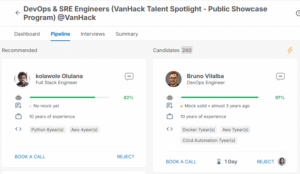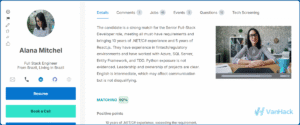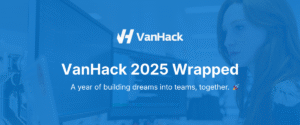San Francisco’s developer job market is among the toughest and priciest globally. If you’re a startup looking to scale, getting a handle on 2025 salary trends is vital to attract skilled engineers without stretching your budget too thin. This article offers 7 practical insights into developer salaries in San Francisco for 2025, with strategies to craft competitive offers, find cost-effective talent, and tap into global hiring. Start recruiting with Vanna now to connect with pre-vetted global talent quickly.
A Look at San Francisco Developer Salaries in 2025
San Francisco’s tech hub status keeps developer pay at a premium, even with economic ups and downs. The mix of giant tech firms, funded startups, and venture capital drives fierce competition for top engineers. For startups, this creates a real challenge: balancing growth with manageable hiring costs.
Market data shows wide differences in pay based on skills, experience, and company size. Demand for expertise in AI, machine learning, and cloud tech has pushed salaries for these roles higher. Meanwhile, remote work trends offer both cost-saving options and new hurdles in local pay discussions.
For startups, grasping these details is critical to stay competitive. Without a smart approach to compensation, you risk overpaying or losing key hires to bigger players.
7 Insights to Tackle San Francisco Developer Salaries in 2025
1. Senior Developer Pay Varies Widely by Source
Salaries for senior software engineers in San Francisco differ a lot depending on where you look. ZipRecruiter lists an average yearly pay of $168,822, with most roles falling between $144,300 and $190,300. But this is just part of the picture.
Broader data paints a fuller story. Total pay, including bonuses and equity, often goes well beyond base salary. Levels.fyi shows a median total compensation of $330,000 for senior engineers, with top earners reaching up to $580,000.
This range comes from differences across early-stage startups with equity-focused offers and large tech firms with bigger overall packages. Startups need to know where their offers stand in this mix to stay competitive.
Action step: Research multiple salary sources to understand the market. Decide if your budget covers just base pay or includes extras like equity, which can be a major draw for senior talent.
2. Niche Skills Drive Higher Pay
Certain technical skills push salaries well above average in San Francisco. Developers skilled in AI, machine learning, distributed systems, or cloud tech often earn 20 to 40 percent more than generalists.
Other high-demand areas include blockchain, DevOps, cybersecurity, and data engineering. Startups in these fields face stiff competition, which bumps up pay rates compared to standard development roles.
The tricky part is deciding which skills are essential versus optional. Overloading job requirements with niche skills can shrink your candidate pool and raise costs unnecessarily.
Action step: Work with your tech leads to pinpoint must-have skills versus nice-to-haves. Hire adaptable generalists for less critical roles and reserve specialized hires for positions that directly boost your product’s edge.
Tools like Vanna from VanHack can help. Our AI-driven matching connects you with candidates who have the exact skills you need, avoiding overspending on unneeded expertise.
3. Experience Levels Set Clear Pay Ranges
Pay for developers in San Francisco aligns with experience, though ranges can shift based on company type. Knowing these levels helps startups build fair, attractive offers.
Here’s the breakdown:
- Junior developers (0-3 years): $120,000 to $160,000 base salary, though true entry-level roles are scarce in this market.
- Mid-level engineers (3-6 years): $140,000 to $190,000, a good balance of skill and cost for growing startups.
- Senior developers (5+ years): Base pay ranges from $130,000 to $201,000, per PayScale data, with total pay often doubling at top firms.
- Staff/principal engineers (8+ years): $200,000 to $300,000 base, with total packages hitting $400,000 to $600,000 at major companies.
Action step: Set clear pay bands for each experience level. Look into remote or global hires for senior roles to keep costs manageable. Offer defined growth paths to justify pay hikes over time.
4. Remote Work Shifts Local Pay Expectations
Remote work has changed how salaries are set in San Francisco. While the city still demands high pay, remote options bring new ways to manage costs and challenges in negotiations.
Many firms now adjust pay based on location, offering San Francisco rates only to those in costly areas. This lets startups tap wider talent pools while controlling expenses. However, remote-only roles might see pay squeezed as companies balance fairness across regions.
For developers, remote work means more choices, ramping up competition for top talent everywhere. Skilled engineers can pick between high local pay or remote roles with better balance or equity perks.
Action step: Define your remote work and pay policies clearly. Offer competitive remote salaries to access global talent instead of fighting solely in San Francisco’s pricey market. Be upfront about location-based pay to avoid misunderstandings.
One smart move for startups is hiring globally. VanHack’s Vanna platform specializes in finding pre-vetted senior talent worldwide, helping you secure skilled engineers at better rates while avoiding local salary wars.
5. Total Pay Goes Beyond Base Salary
In San Francisco, total compensation matters as much as base pay. Equity, bonuses, and benefits often make up 30 to 50 percent of a package’s value.
Here’s what adds up:
- Equity: Early startups offer 0.1 to 2.0 percent for seniors; later-stage firms offer less but with surer value via stock options or RSUs.
- Bonuses: Annual bonuses hit 10 to 30 percent of base pay, tied to performance. Sign-on bonuses range from $10,000 to $50,000.
- Benefits: Health plans, unlimited PTO, learning budgets, and perks like meals or commuting aid can add $20,000 to $40,000 yearly.
Action step: Build a full compensation plan within your budget. Highlight your strongest perks, like equity or growth potential. Show candidates the whole package value, not just the base number.
6. Global Hiring Cuts Costs Strategically
Startups in San Francisco can save big by hiring globally. Developers in regions like Latin America or Eastern Europe often match local quality at 40 to 70 percent of San Francisco pay rates.
This strategy needs careful planning. Time zones, cultural fit, and communication must be handled well. Startups that get this right gain an edge with lower costs and diverse skills.
Global hiring also lets you scale fast without local talent limits. Many regions have deep expertise in specific tech, making targeted hires easier than locally.
Action step: Test global hiring with one or two roles to refine your process. Focus on areas with strong English skills and workable time zones. Use tools to support remote teamwork.
VanHack’s Vanna offers an “All You Can Hire” subscription for $3,000 monthly, covering unlimited hires. Our AI vetting, technical interviews, and mobility support make global scaling affordable and reliable for startups.
7. Fast, Smooth Hiring Sets You Apart
In San Francisco’s tight market, hiring speed and candidate experience can tip the scales. Top developers juggle multiple offers, so delays or sloppy processes can cost you talent, no matter the pay.
The best candidates often take the first solid offer from a company that shows respect and efficiency. Long interview rounds or unclear timelines push them away.
Startups that win streamline every step, from outreach to offer. Clear job posts, quick screening, timely updates, and relevant technical tests make a difference.
Action step: Review your hiring for delays or weak communication. Let managers decide fast on strong candidates. Keep timelines clear and offer quick tracks for standout talent.
Chat with Vanna now to see how AI matching and thorough vetting can speed up hiring without cutting corners on quality.
VanHack: Your Partner for Global Tech Talent
Finding your way through San Francisco’s tough salary market takes access to wider talent pools and efficient hiring. VanHack’s Vanna platform uses AI to match candidates, offers deep vetting, and supports global mobility.
We deliver shortlists of 3 to 5 candidates tailored to your needs from a pool of over 500,000 tech professionals worldwide. Profiles include video intros, AI technical interview scores, and coding test results.
For global hires, our mobility team manages visas and relocation, simplifying the process. Unlike platforms that just connect candidates, we handle the full journey. Our $3,000 monthly subscription for unlimited hires keeps costs predictable for growing startups.
Start hiring with Vanna to sharpen your talent strategy and compete in any market.
Smart Moves for Startup Growth
Competing for developers in San Francisco takes more than matching salaries. Winning startups pair fair pay with growth paths, strong culture, and quick hiring.
Think about what sets you apart. Equity, learning opportunities, tough challenges, or fast career growth can outweigh higher pay from big firms. Many senior engineers value impact over immediate cash.
A clear employer brand draws candidates who fit your vision and tech. This cuts reliance on high salaries and attracts people who’ll stay and strengthen your team.
Looking beyond local hires offers a real edge. Remote and global talent pools bring different cost structures without losing quality. It takes setup work, but the long-term payoff is worth it.
Your Plan and Next Steps
Applying these insights means taking a step-by-step approach, balancing urgent hiring with big-picture goals. Start by evaluating your current pay structure and hiring flow.
First, refine what you’ve got: clarify pay policies, speed up interviews, and improve candidate outreach. These tweaks bring quick wins without major changes.
Next, explore new talent sources, like remote hires in the US or international markets. This needs more planning but cuts costs and widens your skill options.
Finally, scale what works. Build your employer brand, integrate global teams, and use advanced hiring tech for lasting gains. Track metrics like time-to-hire and retention to guide improvements.
Common Questions Answered
Will San Francisco Developer Pay Keep Climbing in 2025?
San Francisco developer salaries hinge on factors like interest rates, venture funding, and tech industry trends. Specialized and senior roles will likely see continued growth due to high demand. However, remote work and global talent may slow rises for general roles. Cutting-edge fields like AI and infrastructure will keep pushing pay up due to limited skilled talent.
How Does Remote Hiring Affect My Local Team’s Morale and Pay?
Adding remote talent works best with clear pay policies and open communication. Many firms adjust pay by location while keeping roles fair. Set these rules early to avoid confusion. Remote hiring can free budget for better local pay or perks, but explain the plan to your team to maintain trust and support.
What’s the Top Mistake Startups Make Hiring in San Francisco?
Many startups focus only on local talent and try matching big tech salaries, which spikes costs and slows hiring. Instead, stand out with equity, growth, challenges, and culture. Another error is overloading job requirements with non-essential skills, driving up pay needlessly. Focus on core needs, craft full packages, and use global talent for better value.
How Can VanHack Help My Startup Hire Top Talent Affordably?
VanHack connects you to a large pool of pre-vetted global tech talent at lower pay rates. Vanna’s AI matching and technical assessments deliver tailored shortlists of 3 to 5 candidates. Our mobility services handle visas and relocation for international hires. A $3,000 monthly subscription for unlimited hires offers steady costs for fast-scaling startups.
Which Tech Skills Are Most Needed in San Francisco for 2025?
AI and machine learning lead demand, especially for large language models, computer vision, and MLOps. Cloud skills like Kubernetes and serverless are key. Full-stack developers with modern frameworks and backend languages like Python or Go stay critical. Data engineering for big data and real-time analytics, plus cybersecurity for app and cloud safety, fetch high pay as priorities grow.
Closing Thoughts: Winning San Francisco’s Talent Game in 2025
The 2025 developer salary scene in San Francisco brings hurdles and openings for startups. Local competition is fierce, and pay for niche roles keeps rising, but smart strategies can build great teams affordably.
Winning means seeing compensation as more than salary. Equity, benefits, growth, and environment all count. Startups offering well-rounded packages and global talent access outpace those stuck on local pay wars.
The big takeaway for 2025? Startups that hire globally while keeping quality high will come out ahead. This opens doors to skilled talent at better costs, creating diverse, strong teams.
VanHack’s Vanna platform helps with global hiring through AI matching, solid vetting, and mobility support. We help you compete for top talent, no matter the location limits.
Ready to grow your engineering team and stretch your budget? Don’t let San Francisco costs hold you back. Find top talent with Vanna now to see how global hiring can boost your team while upholding high standards.



